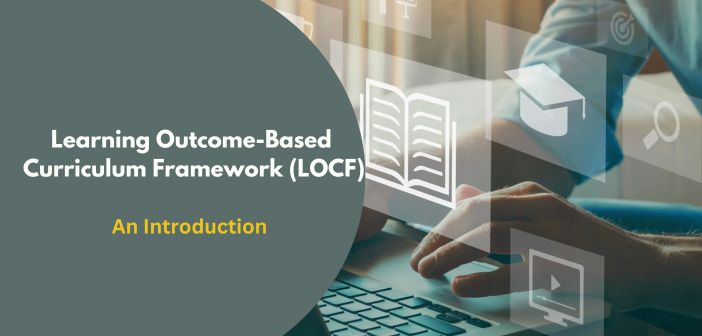Guest author – Dr. Amiya Singh, Pro-Vice Chancellor, Medhavi Skills University

Higher education in India is all set for a transformation that will prepare the students to face a world filled with technology challenges, volatile job markets and innovative ways of work. In this backdrop, developing human potential through well-rounded, confident and competent individuals necessitates changes through curriculum revamp along with suitable practices in pedagogy and assessments. With multiple entry exit options, flexibility and relevance of undergraduate programs is already gaining acceptance; however, given the 21st century workplace requirements, we also need to focus on the predefined learning outcomes of education.
Learning Outcome-Based Curriculum Framework (LOCF) in higher education
One of the most crucial recommendations in NEP 2020 is to adopt a learning outcome based approach to higher education. In consonance with the concept of learning outcomes, University Grant Commission (UGC) has introduced the Learning Outcome-Based Curriculum Framework in higher education. While this has caught the attention of many Higher Education Institutes (HEIs), it is yet to get integrated into the overall curriculum framework in many colleges and universities.
The keyword here is ‘learning outcome’ and it requires a thorough understanding of why the regulators in higher education (e.g. UGC, AICTE) have proposed this shift in higher education to be more visible and effective. Traditionally, most undergraduate programs in India have focused on the goals and objectives of the program. For instance, a degree course in Commerce would specify what the learners would gain in terms of knowledge or a degree course in Humanities would list the course goals and objectives in a generic way. Going by this approach we assumed that the learners, on successful completion of the program would be able to apply the knowledge and skills in a workplace or in real life. However, that was not the case!

Some key shortcomings in the traditional learning framework that made it difficult to assess the learning and match it with the job market and real-life situations:
- Accumulation of theoretical knowledge
- Lack of avenues to apply knowledge
- Low awareness about the importance of skills
- Low on employability and workplace readiness
- Inculcation of values for 21st century world
Domain specific and generic skills for the basis of LOCF
In the Learning Outcome Based approach, demonstration of learning acquired through different means becomes significant. It could be while performing a task in the real work situation of handling a situation in real life – higher education programs need to reorient their curriculum to focus on tangible and observable outcomes. In other words domain specific and generic skills along with knowledge and right attitude form the core of any learning outcome. Let’s look at few examples:
- On a programme level, e.g.; in the domain of Commerce, the learner by the time of passing out should be able to execute Tax filing (Income Tax, GST, etc.), Interpretation of Financial statement, using software to manage accounting data, financial reporting related to audit and SoP etc..,
- On a course level, in a course like Foundation in Digital Skills, the learner should be able execute the tasks like creating an effective presentation, preparing a professional document, using different applications (on PC/Mobile platform), data management using spreadsheet etc.
The above learning outcomes, on a close look, capture the actual learning in terms of how the “knowledge” can be blended with “skills” and “tools” to create the desired output and outcomes by performing specific tasks. At the same time, the learners are required to demonstrate a few generic skills like problem solving, creativity, planning, analytical thinking and so on, which can be embedded within the pedagogy and medium of engagement
Why learning outcomes are important
Why have learning outcomes become so important and how does it impact the key stakeholders – the teachers, the students, the employers and the college or university authorities? In case you are intrigued by this question, let’s delve deeper into the answers. Most importantly, for all the stakeholders, LOCF poses a few challenges.
- For Teachers, it could mean a conscious effort to step into interpreting the learning outcomes, focusing on the learner’s engagement to productivity, and assessment.
- For Students, it calls for a shift in their ways of perceiving learning and assessment.
- For Employers, it means a more participatory role that can lead a demand-driven approach to curriculum and training
- For Authorities in Academics, there is a need to reimagine the vision, and practices while keeping “outcomes” at the center.
It might also interest you to read: Industry-led Higher Education: A New Paradigm for Atmanirbhar Bharat
Implementation of Learning Outcome-Based Curriculum needs a well-synchronized approach with all the stakeholders contributing to the curriculum and delivery. This will lay the foundation of an education system that can track and measure students’ progress and help teachers re-orient their methodology to achieve the outcomes.
In case any HEIs want to get in touch with Medhavi Skills University for the implementation of Learning Outcome based curriculum under NEP2020 can write to contact@msu.edu.in or vc@msu.edu.in.













Out come based helps us in understanding easily as it gives clear vision to the relevant topic/subject